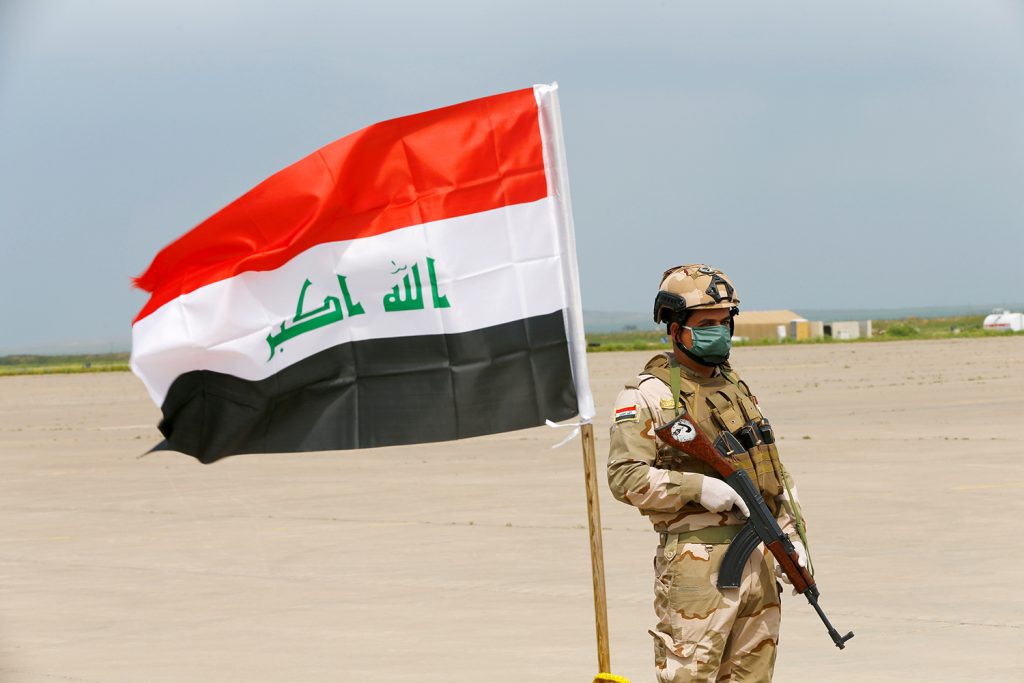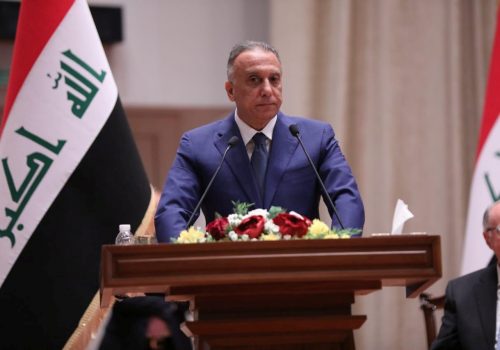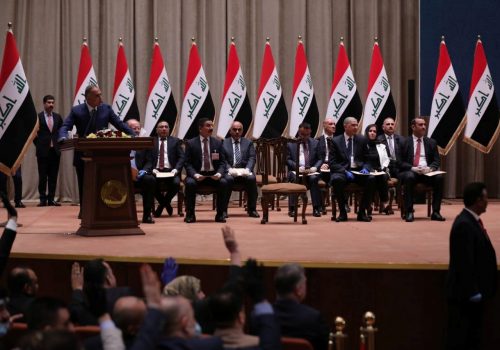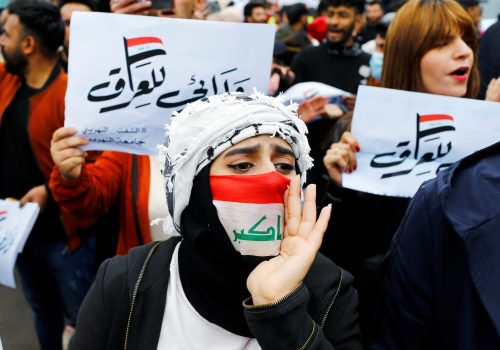On the verge of crucial strategic talks between the United States and Iraq set to take place on June 10, former Iraqi Foreign Minister Mohamed Ali Alhakim said the process is a necessary, long-planned step in ongoing bilateral ties between Baghdad and Washington.
But he took pains to call the process a dialogue involving the US government and the sovereign state of Iraq, one which will define the Pentagon’s future presence in Iraq as well as non-military aspects of the relationship including education, energy, culture, trade, and foreign investment.
“Here in the local papers, they’re calling it negotiations, but we are not negotiating anything,” Alhakim said. “It’s an agreement signed by the two sides. The only thing we need to do is figure out the bits and pieces.”
Speaking June 9 in a webinar with Abbas Kadhim, director of the Atlantic Council’s Iraq Initiative, Alhakim noted that because of COVID-19, the upcoming talks will be held virtually—a departure from the long-standing arrangement of alternating the sessions every six months between Washington and Baghdad.
“Getting the dialogue going is very important. The question is, how do we take advantage of technology and make sure we accomplish as much as we can?” he said. “Our team has put together an agenda, divided into sectors. These will be discussed individually.”
Alhakim served as Iraq’s foreign minister from October 2018 until last month, when former intelligence chief Mustafa al-Kadhimi became the country’s prime minister—ending five months of deadlock following the resignation of Prime Minister Adel Abdul Mahdi.
As Kadhim pointed out, the dialogue coincides with “a very rough time” for Iraq as the country faces the triple whammy of collapsing world oil prices, an alarming rise in COVID-19 infections, and increasingly frequent attacks by Iranian-backed militias on US troops stationed in Iraq.
The virtual dialogue is also taking place only half a year after US President Donald Trump approved a drone strike in Baghdad that killed Iranian Major General Qasem Soleimani, commander of the Quds Force, as well as top Iraqi militia leader Abu Mahdi Al Muhandis.
As of June 10, Iraq had confirmed 14,268 coronavirus cases—up 93 percent from a week earlier—and 392 deaths. The World Bank has projected that due to the fall in demand for crude oil, Iraq’s only real export, the country’s economy will shrink by 9.7 percent this year—its sharpest decline since 2003.
“The dialogue between us and the United States has never stopped. We’ve been in continuous dialogue, specifically to execute certain provisions of our SFA,” Alhakim said in reference to the country’s Strategic Framework Agreement signed with the United States in 2008. “Where do we go from here? Do we continue on the same path? This will be answered in the first ten or fifteen minutes, just to figure out where the two sides are.”
Alhakim, who’s since been replaced as Iraq’s foreign minister by Fuad Hussein, conceded that his tenure was rather short.
“When I took this job, I didn’t think it would be easy,” said the sixty-seven-year-old veteran diplomat. “Iraq, having been at war for decades, never settled down and built its institutions correctly. When we came into office, we thought we’d be doing more reform, because we had just finished fighting ISIS.”
The Mahdi government tried to fight corruption at all levels of government, he said, “but the root cause is so deep. This needs time as well as strong effort and legislation from parliament. We also need to figure out how to diversify our revenues instead of getting it only from oil. So far, it’s been a very difficult road.”
He added: “Security is important, but so is finance and health. These are part of the SFA, and this is where the US and other countries are actually helping us, along with the International Monetary Fund. We need help with humanitarian issues. These are not really under the radar; they are visible, and this money is assisting Iraqis.”
Alhakim was asked whether—given the US presidential elections in November and Kadhimi’s promise to organize early elections in Iraq—strategic talks with Washington were even appropriate or warranted now.
“This dialogue is appropriate, and it’s timely as well. Our relationship went into sort of a quiet mood and we want to reinvigorate it,” he replied. “I don’t think elections in either the US or Iraq should be a reason for stopping this dialogue. It’s healthy to put all the issues on the table and figure out what we’re going to do next.”
Larry Luxner is a Tel Aviv-based freelance journalist and photographer who covers the Middle East, Eurasia, Africa and Latin America. Follow him on Twitter @LLuxner.
Further reading:
Image: An Iraqi soldier wears a protective face mask and gloves, following the outbreak of coronavirus disease (COVID-19), as he stands guard during the hand over of Qayyarah Airfield West from US-led coalition forces to Iraqi Security Forces, in the south of Mosul, Iraq March 26, 2020. REUTERS/Thaier Al-Sudani



